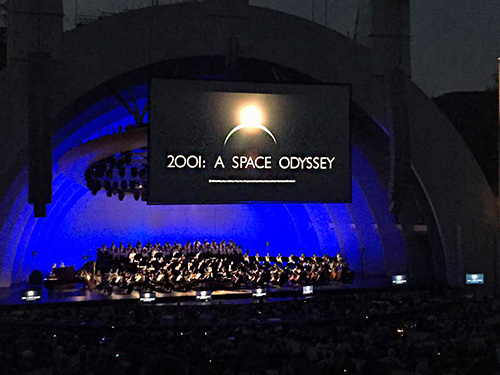

  |
|
|
||||||||||||||||||||||
|
FMS FEATURE... August 19, 2015 2001: A Space Odyssey Live at the Bowl LA Phil and Master Chorale perform score to Kubrick's classic film by Jon Burlingame HOLLYWOOD—Stars overhead, and celestial beauty on the big screens in the Cahuenga Pass: An estimated 11,000 watched as the Los Angeles Philharmonic played, live-to-picture, the classical-music score of 2001: A Space Odyssey Tuesday night at the Hollywood Bowl.  Photograph by Dave Bossert Brad Lubman conducted the Philharmonic, and the 60-voice Los Angeles Master Chorale. Stanley Kubrick's 1968 classic is often screened, but this was a rare opportunity to hear the music performed live with the movie's extraordinary imagery ("the ultimate trip," as MGM once billed it). The weather was cool but the crowd was enthusiastic, bursting into applause and cheers as the title card appeared to the iconic strains of Richard Strauss's Also Sprach Zarathustra. The Bowl's five large screens (and eight smaller ones for those seated closest to the stage) shone with exceptionally vivid and sharp images, and the orchestra seemed to be mixed at a higher-than-usual level – entirely appropriate for a film that is as pure a visual-and-aural experience as any ever made. Nine minutes into the film, Gyorgi Ligeti's Requiem began. It recurs every time the monolith appears (during the "Dawn of Man" sequence, later when one is discovered buried on the moon, and finally when astronaut Dave Bowman encounters one near Jupiter). As often as we have seen and heard this as played in the movie, it seemed even more effective, eerie and intense as performed by choir and orchestra. The grace and beauty of spaceflight was emphasized by Johann Strauss's Blue Danube waltz during scenes of the Pan Am space clipper performing the delicate docking maneuver with the space station (and again as Heywood Floyd takes the Aries lunar shuttle to the Clavius base). Then, during the Moonbus ride to the Tycho crater where the monolith awaits, we heard the magical, mysterious Lux Aeterna, another Ligeti composition discovered by Kubrick as he edited the film in 1967. Kubrick chose to emphasize the long and lonely journey for astronauts Bowman (Keir Dullea) and Frank Poole (Gary Lockwood) with Aram Khachaturian's Gayane ballet music. The film is devoid of music until the HAL 9000 computer starts acting strangely, then murders Poole, and Bowman must lobotomize it to save himself and the mission. There was considerable audience laughter as the desperate HAL made excuses to Bowman ("I know I've made some very poor decisions lately" among the more popular lines). The return of the monolith triggered a reprise of the Requiem before the orchestral clusters of Ligeti's Atmospheres, as Bowman leaves the Discovery and enters the Stargate ("beyond the infinite," as Kubrick describes it in the film). The rumbling sound effects tended to overwhelm the music in this late portion of the film, but the overall effect was as mind-blowing as when we first saw the film 47 years ago. And, of course, the return of Zarathustra for the birth of Kubrick's Starchild, and a final reprise of the Blue Danube, capped the nearly three-hour show. ©2015 Jon Burlingame |
Search
Past Features
Feature Archives
|